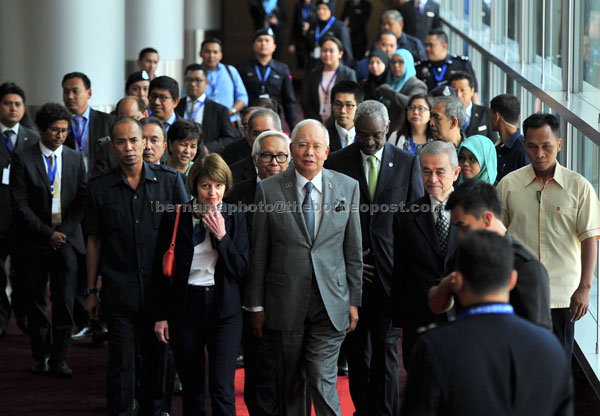
Najib (centre) arrives for the opening of the Fourth Plenary Session of the United Nations Inter-government Platform on Biodiversity and Ecosystem Services. — Bernama photo
KUALA LUMPUR: Prime Minister Datuk Seri Najib Tun Razak yesterday launched the revised National Policy on Biological Diversity to guide biodiversity management over the next 10 years from 2016.
The policy emphasised the need for continued conservation, sustainable utilisation and the sharing of benefits from biodiversity in a fair and equitable manner, he said in his address at the fourth plenary of the Intergovernmental Platform for Biodiversity and Ecosystem Services (IPBES) at the Kuala Lumpur Convention Centre here.
Najib said the policy had clear targets, actions and timelines for implementation and called for the active participation by all stakeholders, including state governments and non-governmental organisations.
“This revised policy complements Malaysia’s obligations under the United Nations Convention on Biological Diversity and to implementing the sustainable development goals,” he said.
Also present at the event were former prime minister Tun Abdullah Ahmad Badawi, Natural Resources and Environment Minister Datuk Seri Dr Wan Junaidi Tuanku Jaafar and IPBES chairman Prof Zakri Abdul Hamid.
Najib said Malaysia was trying hard to forge a balance between socio-economic development and environmental well-being, in particular conservation of biodiversity and ecosystem services.
Malaysia had quite a bit of experience in finding the right balance in bringing much-needed development without sacrificing nature, he said.
He said that in efforts to alleviate poverty, Malaysia had introduced the Federal Land Development Authority (Felda) schemes in 1956, opening jungles to establish rubber and oil palm smallholdings for the landless.
“Our government realised early that the only way for people to break free from the vicious circle of poverty was for planned and coordinated development to ensure that economic development goes hand in hand with social development,” he said.
Najib said development through the opening of land for agriculture, human settlement, industrialisation and transport had a significant impact on the natural environment.
However, he said, Malaysia had taken steps to conserve biodiversity through the national initiative called the Central Forest Spine that linked four main forest complexes which formed the central mountain range in peninsular Malaysia.
He said the Sabah government also planned to increase its protected areas with the creation of the Tun Mustapha Marine Park, the nation’s largest reserve covering close to one million hectares.
Najib said that at the regional level, Malaysia joined Indonesia and Brunei in the ‘Heart of Borneo’ initiative to together conserve about 200,000 sq km of forests, about 30 per cent of which was in Malaysia.
“And, as always, there is room for improvement. Science can provide many of the answers to today’s sustainable development problems.
“We need to leverage on the expertise of the scientific community to provide options and scenarios so that leaders can formulate better policies,” he said.
The revised policy aims to ensure that the 17 national biodiversity targets, which include at least 20 per cent of terrestrial areas and inland waters and 10 per cent of coastal and marine areas, are conserved by 2025.
It will also ensure that poaching, illegal harvesting and illegal trade of wildlife, fish and plants are under control and significantly reduced, and production forests, agriculture production and fisheries are managed and harvested sustainably.
On another matter, Najib said progress had been made in finding concrete measures to deal with the recurring regional haze.
A few months ago, at a meeting of chief scientific advisers from the Asia-Pacific Economic Cooperation economies, the prime minister requested a solution to the haze which has been afflicting countries in Southeast Asia over the past 18 years.
“I am told that the group is making progress and I hope that we can soon determine some concrete measures in dealing with this recurring environmental catastrophe,” he said. — Bernama
